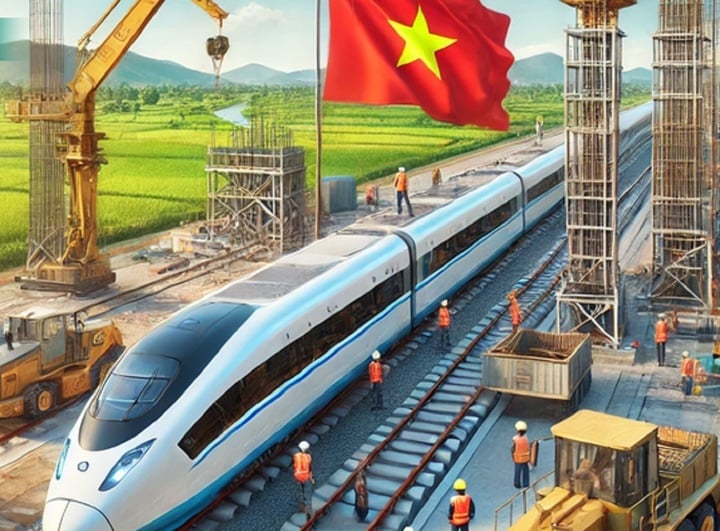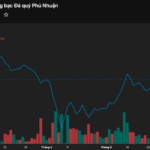The North-South High-Speed Rail Project is a significant infrastructure development in Vietnam, and the participation of private enterprises in its construction has been a topic of discussion. While it is encouraging to see private enterprises expressing interest in this project, it is crucial to carefully evaluate their capabilities and suitability.

Illustrative image of the proposed North-South high-speed rail project.
Positive Signals from Private Enterprises
Representative Nguyen Quang Huan from Binh Duong province, and Vice Chairman of the Vietnamese Private Entrepreneurs Association, expressed his support for the involvement of private enterprises in the high-speed rail project. He stated: “I support the idea of private enterprises taking on this project as leaving it solely to the state will create a burden. We have many private enterprises with strong economic capabilities and experience, which are well-equipped to handle such a key project. Additionally, Decree 68 also encourages the participation of private enterprises in significant state projects, like the North-South high-speed rail.”
Representative Pham Van Hoa from Dong Thap province shared a similar sentiment, viewing the enthusiasm of private enterprises as a positive sign of their willingness to take on significant national responsibilities. This also showcases the confidence and initiative of these enterprises in the nation’s progress.
Representative Hoang Van Cuong from Hanoi also supported the idea but emphasized the core requirements that private enterprises must adhere to when undertaking such a crucial infrastructure project. He reminded that even though private enterprises are investing, they must still follow state regulations and requirements, especially for projects of national importance.
Cuong further highlighted the importance of ensuring that the selected investors are truly domestic and not merely assembling or processing imported foreign products or components. To achieve the project’s goals, it is vital to encourage domestic investors to commit to localization and collaborate with other domestic enterprises to produce components, accessories, and equipment based on foreign technology.
Not All Private Enterprises Are Equally Qualified
Representative Nguyen Quang Huan suggested that there should be specific standards and criteria for selecting private enterprises to participate in the high-speed rail project. Not all private enterprises have the necessary qualifications, and a national council should be responsible for evaluating and objectively assessing companies’ scientific, technical, experiential, human resource, and financial capabilities. Early disclosure of these criteria would help prevent an overwhelming number of enterprises from registering, saving time for both the government and the enterprises.

A national council should evaluate enterprises based on specific criteria for the high-speed rail project. (Illustrative image)
Huan cited international practices where countries set criteria before inviting bids for major projects, allowing them to choose contractors that align with their goals. He suggested that the government should establish specific criteria for the high-speed rail project to facilitate the selection of qualified private enterprises.
Representative Pham Van Hoa agreed, emphasizing the need to select enterprises with substantial human and financial resources. He stated: “It is imperative to consider the financial scale, construction progress, and experience of the enterprises. These are essential conditions for their selection.”
Economist Le Dang Doanh welcomed the idea of engaging private investment in significant national projects instead of solely relying on foreign investors. However, he cautioned that while this is a positive sign, it is necessary to assess the enterprises’ capabilities and suggested the formation of a highly specialized council to evaluate their qualifications.
Transport expert Nguyen Xuan Thuy affirmed that private enterprises are capable of executing key projects like the North-South high-speed rail. However, he noted that they might lack experience and technical expertise. Therefore, to ensure the project’s success, only private enterprises with a proven track record, such as VinSpeed of the VinGroup, should be considered. Thuy believed that private enterprises would be responsible for every dollar they invest, but he cautioned that the project’s scale should match the enterprise’s capabilities.
“Global Investment Firm Pours $3.5 Billion into Vietnam’s Economy through M&A Deals with Vingroup, Masan, and Imexpharm.”
On the afternoon of May 29, as part of his working trip to attend the 30th Asia Future Conference in Tokyo, Deputy Prime Minister Nguyen Chi Dung and his government delegation met with Mr. Tae-Won Chey, Chairman of SK Group.
A Resilient Market, Consumer Recovery: Are Staple Stocks the Next Big Thing?
As global interest rates cool off and recession risks in major economies are gradually contained, international capital has shown signs of returning to emerging markets in Asia. Vietnam stands out with its stable macroeconomic foundation, rapidly growing consumer base, and expected upgrade in the near future.














































